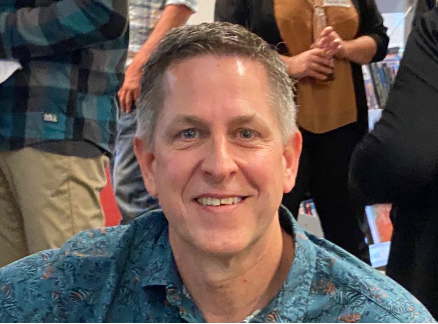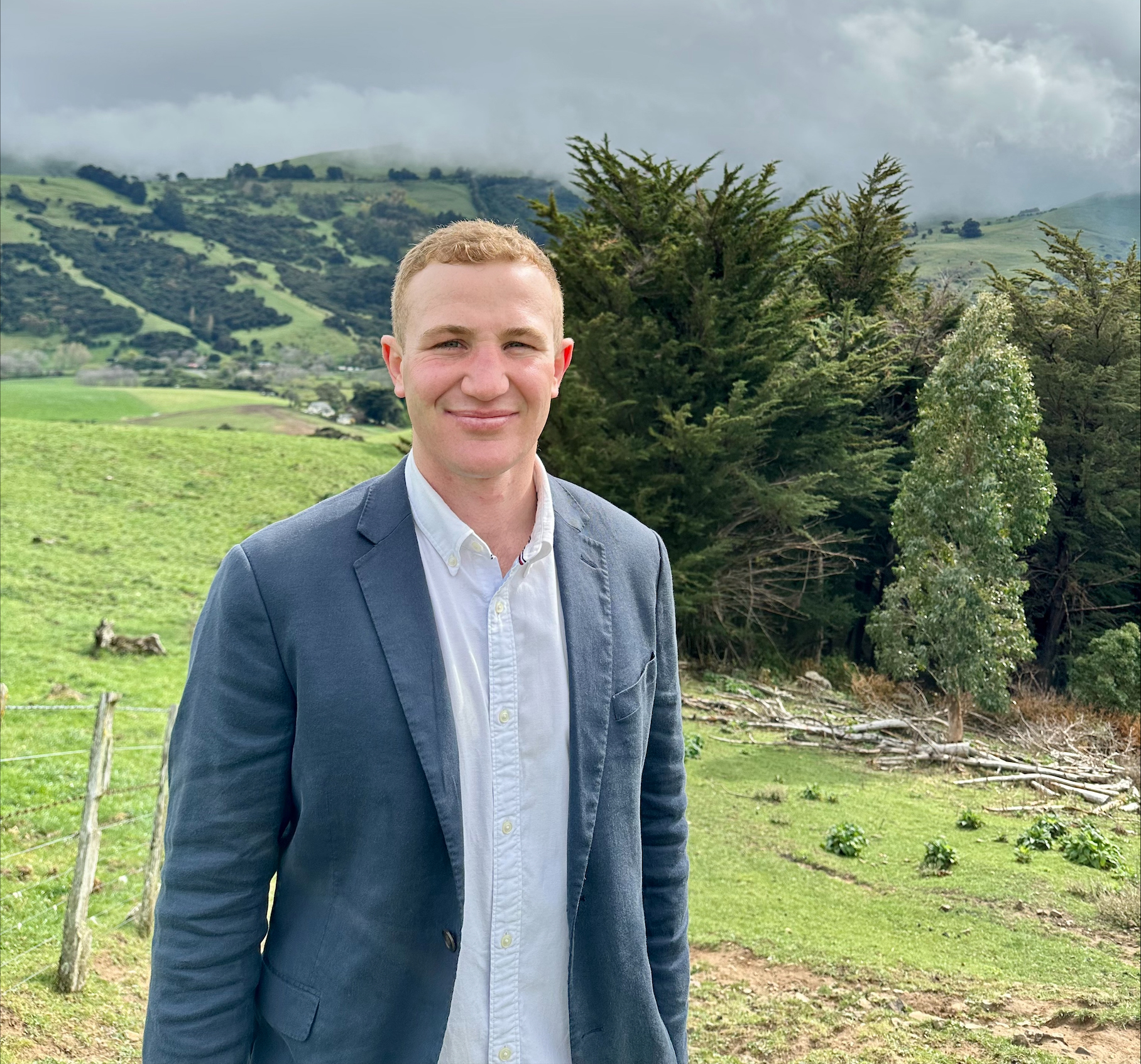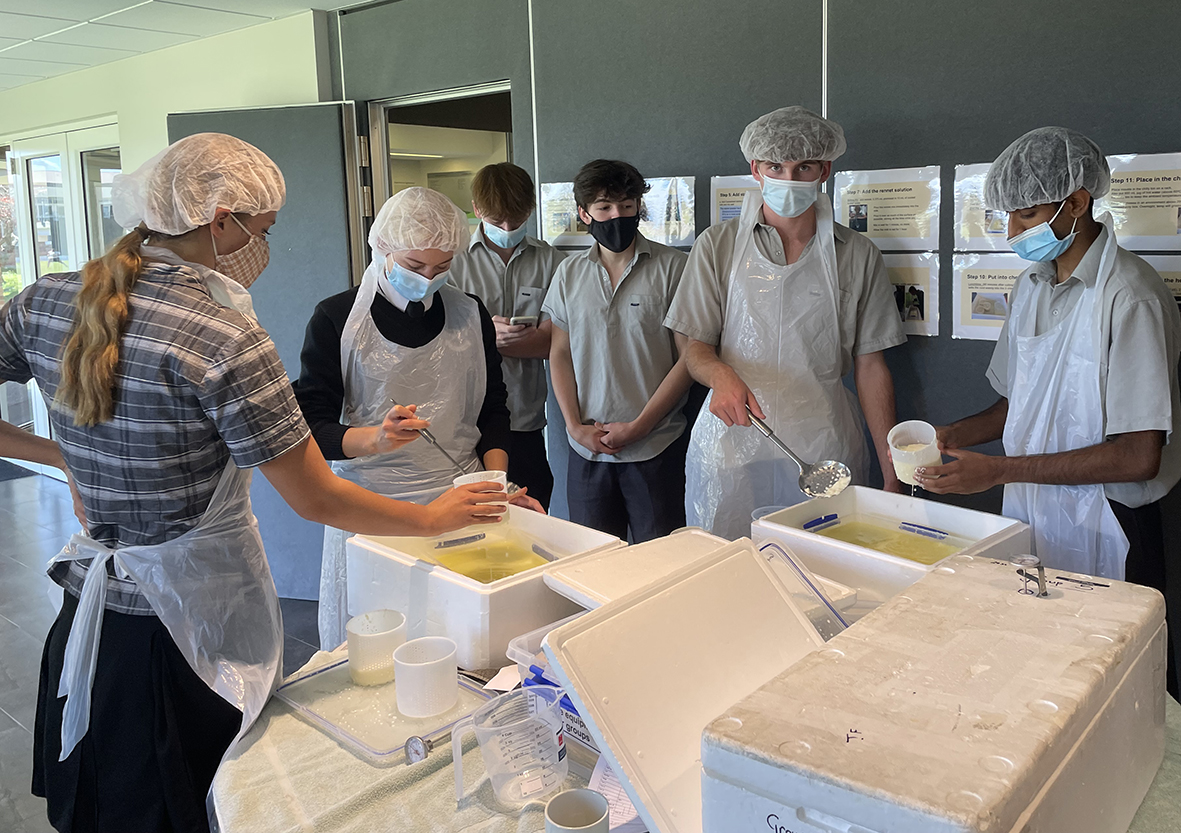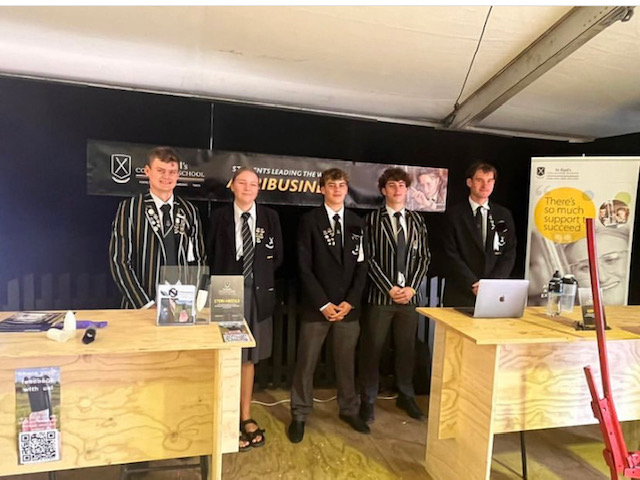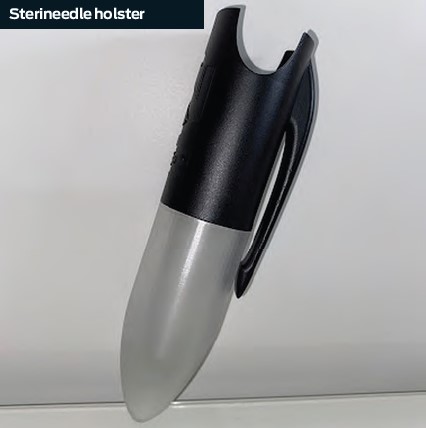Scholarship student thrives in Agribusiness
Like any prosperous working sector, Agribusiness is sustained not only by dedicated industry workers and extensive advocacy, but by the next generation of industry leaders readying themselves to enter into the primary sector’s exciting and multi-faceted workforce.
Among these young leaders is 17-year-old Charlotte Belz, An accomplished all rounder who has entered her second year of boarding at St Paul’s Collegiate School. With the support of the Donny Trust Agribusiness Scholarship, she is loving everything about school life.
The scholarship assists in funding boarding and tuition costs at St Paul’s and is awarded to students with a stellar academic record, great interpersonal skills and a passion for the primary industries.
"Receiving the Donny Trust Agribusiness Scholarship, and being able to attend St Paul’s has meant that I’ve been able to learn a lot about the agricultural industry and benefit from the school’s specialised Agribusiness programme. The scholarship made it possible for my parents to afford for me to attend St Paul’s as a boarder and benefit from everything the school has to offer. I know they are thankful for the support, and so am I."
Charlotte has a passion for animal care and places emphasis on how the Agribusiness programme is helping her to navigate her way towards a primary sector career, specialising in something she is passionate about.
“At this stage, I plan to attend Massey University to study a Bachelor of Veterinary Science. My three years of Agribusiness studies will be very helpful with my aim of becoming a large vet.”
It is important to acknowledge the organisations that provide students like Charlotte with vast opportunities as it is this support that ensures the primary sector always has fresh new faces coming to lead the future.
Agribusiness in Schools profoundly thanks the Donny Trust for their immense contribution to remarkable students like Charlotte, as well as their unwavering dedication to agricultural education. It is these opportunities that allow the next generation to thrive in their endeavours towards the primary sector.
Agribusiness in Schools also applauds Charlotte for her progress in the Agribusiness programme and is thankful for the contributions she makes to her education to ensure a bright future for herself and the future of the primary sector, who will be lucky to have her on board.
The Future is Growing - FIELDAYS 2024
Day one of New Zealand National Fieldays 2024 started off strong seeing thousands of Kiwis through the gates of Mystery Creek, as well as the usual abundance of exhibitors showcasing the latest primary sector technologies, products and advice. Of course as a programme which creates opportunities for young budding primary sector personnel, Sow the Seed made a very necessary appearance to pass on the most essential thing you could to flourishing industry workers, knowledge!
Situated in the Careers and Education Hub at Site 30, Sow the Seed and Agribusiness in Schools teamed up to give the rundown to Fieldays goers on what the primary sector has to offer them. We were both surprised and thrilled to see what these bright-eyed students had to offer us.
Though unsure of what our exhibition was all about at first, students were keen to chat with the Sow the Seed and Agribusiness in Schools team to find out. A great deal of our visitors come from a rural background and are hoping to follow in the footsteps of their older family members. Others wished to forge their own path in their primary journey. It was great to meet potential aquaculture workers, stable hands, beekeepers and much more.
One student says: “I’m homeschooled but the cool thing about it is that I get to help dad with our sheep sometimes...like I’ll have a few hours of school and then it’s out into the field. It’s a good balance for me.”
Another admits not being aware of what the primary sector actually is, only to discover she’s been dreaming about a role in the industry since she was 8 years old.
“I LOVE horses. I ride as much as my parents let me and my Grandad owns 2 out in Ngāruawāhia, Baxter and Merv. I really like helping out with them and I’d love to do something like that for a job when I’m older.”
Our trusty careers wheel proved to be a popular attraction with our visitors, encouraging them to have a spin and find out the many pathways they could get into.
Seeing so many of the next generation interested in what the primary sector has to offer is firm reassurance of the future of farming. It appears to be, like the next generation who will lead it. Promising.
The Village it Takes.

The old saying goes, ‘It takes a village’, and in the case of Agribusiness in Schools, it absolutely does. The programme has seen its fair share of trial and tribulation, faced with the hefty task of destigmatising agriculture as a ‘non-academic’ and often ‘last resort’ subject. Contrary to such harmful stereotypes, the masterminds behind Agribusiness in Schools strive to ensure a high quality of education, honing in on applied science and commerce and encouraging students to take on an innovative and solutions-based approach in their thinking. The tremendous efforts made to create opportunities for future agri-experts has seen great success today as Agribusiness in Schools celebrated their 10 year anniversary in 2023 among a plethora of other milestones.
Discussion of bridging the agriculture gap in schools sparked in late 2013, at the Young Farmers Competition where parents and industry workers expressed a keenness to see more career pathways in agriculture. The programme was then piloted at St Paul’s Collegiate in Hamilton with the help of an intimate team of agri-advocates.
Within this team is the Agribusiness in Schools Curriculum Director, Kerry Allen, who has played a fundamental role in shaping the programme. Kerry hails from a rural upbringing, with broad knowledge and experience in Agricultural and Horticultural Science. Kerry’s passion for getting the next generation into the primary sector is evident in her long-term dedication to programme and major contributions to creating opportunities for agri-students. Kerry says:
“Our ultimate goal is to get as many schools, students and teachers into the programme. Not everyone is going to do it but the least we can do is build an awareness that it’s out there. ”
While Kerry and her team sit at the heart of Agribusiness in Schools, we also recognise the efforts, faith and guidance given to the programme from our wider support group of business partners.
Agribusiness in Schools found early support from DairyNZ, Beef+LambNZ, LIC, Gallagher, BNZ, Tetra Pak, Meat Industry Association, Campbell Tyson, AGrowQuip, Waitomo Petroleum, AGMARDT and Fieldays.
In the budding days of the programme this industry guidance has been central in providing innovative ideas, extensive support, financial contribution and the necessary consultations for what should be taught in schools for students to thrive in the Primary Sector. Kerry says:
“Without those original business partners, the programme wouldn’t be where it is...we are eternally grateful to them.”
Coming into the present day, several of these patrons continue to give the programme ample support as we move through another year of bringing awareness to students and educators about what the Primary Sector has to offer them.
To our supporters past and presently; DairyNZ, Beef+LambNZ, Gallagher, AGMARDT, Rabobank, Meat Industry Association, Fieldays Association inc, NZKGI, Fairview, GoHort, MG Trust and Waikato Farmers Trust, Agribusiness in Schools extends a most sincere thank you for your contribution to building and backing our foundation over the last ten years. We look forward to what the programme brings in 2024.
A Conversation with Dr Craig Preston, Director of Agribusiness at John McGlashan College.
17th August 2023 | Written by Catherine Bryant
In what other subject does there exist the unique blending of academia, innovation, and real-world application? We sat down with Dr Craig Preston, the Director of Agribusiness (who also teaches Science, Bioethics and Health and IB Biology) at John McGlashan College in Dunedin, to discuss this rewarding role and the benefits of being a teacher of Agribusiness in a secondary school.
Armed with an impressive academic background, including a PhD in Bioethics and Theology, a Bachelor of Science in Anatomy and Structural Biology, an Honours in Reproductive Biology (Polycystic Ovarian Syndrome), and experience lecturing to medical professionals, Dr Preston's journey into secondary school education was fuelled by his passion for teaching and the desire to directly influence the educational path of young minds. Recognising this calling, he pursued a Graduate Diploma of Teaching from Otago University. While Preston's original training may not have encompassed Agriculture or Business Studies, his diverse academic knowledge and innovative mindset (not to mention a strong nudge from his Headmaster, Neil Garry!) played a pivotal role in shaping the Agribusiness programme at John McGlashan College.
“To teach Agribusiness is fantastic, it’s so innovative and, within reason, you can write the script as long as it can lead to NCEA assessment; and there is no shortage of interesting and engaging material for activities in class and some of the best school field trips you'll ever take.”
Dr. Preston’s position as Director of Agribusiness was the result of a visionary opportunity. In 2017 John McGlashan College was invited to be a lead school in the development of the Agribusiness in Schools programme, originally a St Paul’s Collegiate School initiative that went on to become a nationwide NCEA-approved subject. Dr. Preston’s academic expertise proved invaluable in designing a course that would become a point of differentiation for the school. In Preston’s words,
"It remains highly popular and fills up every year."
Agribusiness at John McGlashan College is a subject that also includes girls from sister school Columba College and has been a resounding success since its inception. The combining of educational resources is distinctive to John McGlashan College and Columba College. Other secondary schools can offer their own Agribusiness course with subtle variations in the delivery of the curriculum.
One might question the academic rigour of Agribusiness, especially for students strong in Math and Science. However, Dr Preston dispels any doubts by highlighting that Agribusiness requires prerequisites in Math, Science, and English and Merit-level grades to apply. The course is specifically designed for academically inclined students who aspire to pursue higher education and successful careers in the Primary Industries. Dr Preston explains that Agribusiness students develop an ability to analyse situations from multiple angles, equipping them with skills that extend beyond traditional classroom learning.
Preston elaborates on the diverse assessments that Agribusiness students undertake.
“All our assessments include an amazing practical component which feeds into the academic reporting afterwards. We make beer, biltong, and cheese at times to learn about supply chains and adding value to products. We also produce, brand, package, market and sell these products as part of a 6-credit marketing plan assessment. All assessments are as academic as any NCEA subject, and in fact, requires a higher level of innovative thinking in many cases due to critical thinking demands and justification of viewpoints”.
The positive outcomes of this style of learning and assessment are evident in the results. Dr Preston proudly notes that approximately 85% of Agribusiness students proceed to further studies and related careers, ultimately contributing to the growth and success of New Zealand's primary industries.
Agribusiness teachers have the opportunity to shape young minds, inspire innovation, and¬¬ witness the direct impact of education on real-world challenges. In a rapidly evolving agri-technology landscape, the role of an Agribusiness teacher gains significant importance. This responsibility involves staying updated with evolving trends and current research – essentially, educators become lifelong learners themselves, but above all, it's about empowering future leaders in the dynamic field of Agribusiness.
“I would recommend teaching Agribusiness for sure - one of the best subjects now available in the NCEA curriculum”.
From classroom to global marketplace
How Agribusiness at Secondary School paved the way
27th September 2023
In the ever-evolving world of New Zealand’s primary industries, one young man’s journey is a testament to the power of education. Meet Sam Howard, a twenty-three-year-old Silver Fern Farms Graduate, in his second year whose path to success was paved by a crucial steppingstone: Agribusiness in Schools.
Sam, who grew up in the centre of Wanaka, first began working on Bendigo Station during his holidays at the age of 15. He was operating heavy equipment, engaging in stock work, and worked two summers silage contracting. Although not from a farming background, he embraced a rural lifestyle, and his weekends were filled with dirt biking and hunting.
In his earlier years, Sam admitted that he was not the most committed student, but everything changed when he discovered the subject of Agribusiness. The turning point came in Year 12 in 2017 when Roy Gawn, a Science teacher at Mt Aspiring College, who had a passion for the primary industries, introduced the new course. Sam and his mother attended an information evening and were intrigued by the possibilities Agribusiness offered. Roy had high expectations and encouraged those who wanted to excel, and this was the motivational spark that Sam needed.
“Our will to impress a knowledgeable, and passionate teacher led to our output being maximised and a realisation that when I actually enjoyed something, I worked really hard at it. I started to get grades at Excellence level, which acted as a momentum booster for my other subjects and helped with my overall schooling”.
An Agribusiness fieldtrip, visiting Mt.Burke Station (a generational sheep and beef farm), with stunning views of Lake Wanaka, left a lasting impression on Sam. This was in support of an assignment around business operations, where the owners had diversified their income by offering weddings, heli-biking and other events.
Having been given this unique perspective on the agricultural sector beyond the boundaries of traditional farming, Sam soon realised that a lifetime on the farm was not for him. He decided to pursue a degree in Agribusiness and Food Marketing at Lincoln University in 2019, where he gained insights into the broad range of careers available in the agricultural sector. Sam’s fellow graduates all work in diverse fields, from rural banking to exportation logistics showcasing the industry’s vast opportunities.
“Attending Lincoln University fully convinced me of my passion to fulfil a career contributing to the future success of New Zealand agriculture on the world stage. Our hard-working producers create some of the most superior food products globally, with an extremely unique origin story. Going forward, I have a hunger to contribute to selling the distinctive production story, gaining the greatest value and rewarding Kiwi producers and companies in a vast global setting”.
After completing his degree, Sam joined the Silver Fern Farms Graduate Career Programme, which involves three one-year rotations across various business areas to provide a holistic understanding of the industry. In his current year on a “Sales” rotation, Sam manages the Australian market and customers who export into smaller niche markets, (that Silver Fern Farms does not directly supply into) such as the Pacific and Indian Ocean Islands, and parts of the Caribbean. He handles inquiries about eligibility and specific country requirements, selling a diverse range of beef, lamb, and venison products. In his first year, he worked in the corporate and logistical side of livestock management, focusing on the initial supply chain and incorporating the values of He Waka Eke Noa - a partnership supporting environmental preservation and well-being for current and future generations.
In his daily work, Sam is continually amazed by the substantial impact of external factors that impact New Zealand’s primary export markets such as the Ukrainian war and Its effect on energy prices in Europe, post COVID-19, consumer confidence in China, worldwide inflation and changing weather patterns. However, Sam views these challenges as opportunities for the industry to adapt and innovate in response to changing conditions.
“It surprised me just how strong and volatile our position can become due to global factors such as economic wellbeing, geopolitical tensions, and large-scale production in other nations flooding the markets. This can all happen in the matter of a year’s quarter. It can be quite a rollercoaster, but you gain invaluable insights when navigating a downward market.”
Silver Fern Farms are extremely proud of the young people in their company. A highlight last year was being invited to attend a sustainable, entrepreneurial dinner at the ‘Beehive’ called “Festival for the Future,” sponsored by Silver Fern Farms. It marked a significant milestone as it was the first time their Net Carbon Zero beef had been consumed in New Zealand, making it a truly special opportunity. Sam emphasises the importance of gaining exposure to different facets of a multibillion-dollar business like Silver Fern Farms. This exposure, he believes, is critical for acquiring an in-depth understanding, especially during the development phase of one’s career, setting the duration of the programme apart from others available in the red meat industry.
“Working in such a complex environment, it typically takes around four to six months to truly develop the confidence and expertise required to excel in a specific role or rotation”.
When it comes to promoting Agribusiness to future generations, Sam believes Year 11 students, at the threshold of making crucial career decisions should be our main target. While social media is a great tool for creating awareness, parents remain pivotal in influencing their children’s subject choices. Sam advocates for highlighting the exciting aspects of agricultural careers, such as extensive travel opportunities, job security, and the unique blend of practicality with corporate-style work.
“In a volatile market there may be restructuring, but when you’re involved in food production, global population growth and the demand for our top-quality products, a large percentage of jobs will remain and won’t be replaced by technology, more so than other sectors.”
Sam is committed to paying it forward by sharing his insights and experiences. He believes that consistent positive messaging will encourage more young people to explore rewarding careers in the primary industries. The vital role played by programmes such as Agribusiness in Schools and the passionate teachers that drive them is evident in Sam’s career making decisions. The Agribusiness in Schools programme demonstrates the profound influence of education on young minds within a sector integral to the prosperity of New Zealand.
Introducing students to the practical and theoretical side of farming and beyond
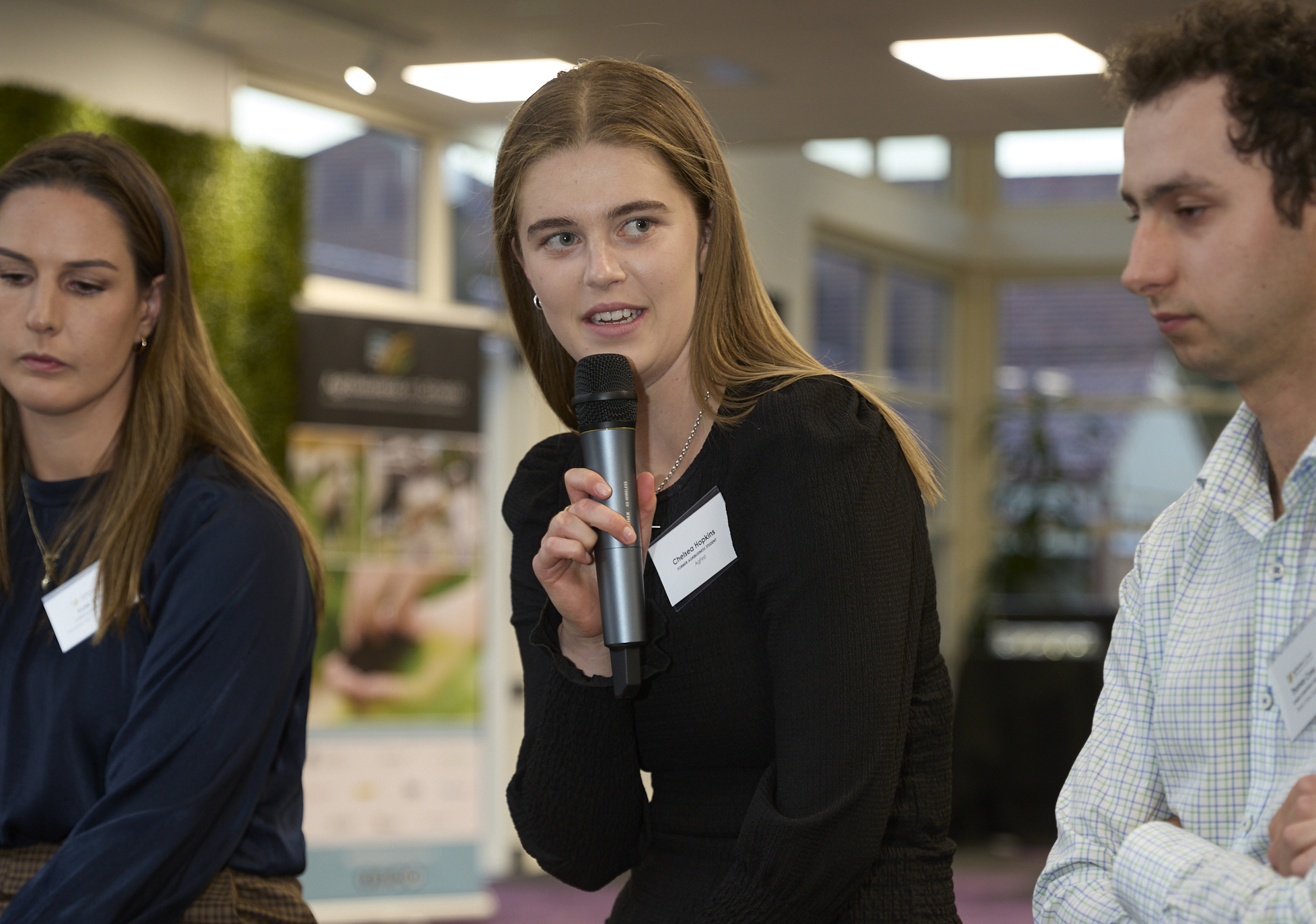
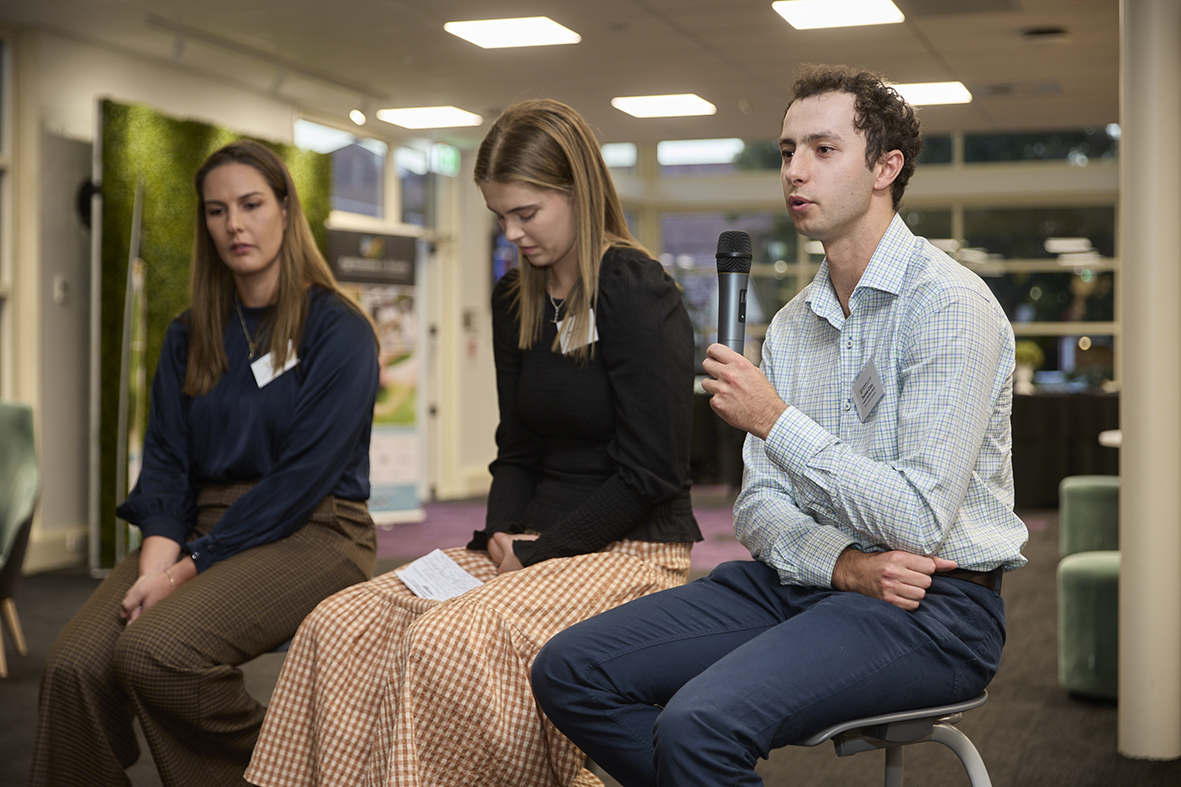
Providing a pathway for youth to gain meaningful and enjoyable careers
Thomas Cross has been involved in agriculture his whole life. He grew up on a sheep and beef farm located on the Otago Peninsula where his family has been farming for seven generations. Thomas has always been interested in the practical side of farming, however whilst attending John McGlashan College became more focused on the theoretical side. This was further encouraged by John McGlashan offering Agriculture as a subject in Year 10 and 11 and then Agribusiness in Year 12.
The opportunity to take Agribusiness as a subject was a great opportunity for Thomas as it combined Agriculture with other subjects he was also interested in such as Science and Accounting. He enjoyed the subject content a lot and found the learning very relatable to working on his own family farm.
Through taking both Agricultural and Horticultural Science and Agribusiness, Thomas then decided to pursue a Bachelor of Commerce majoring in Agriculture and Professional Accounting at Lincoln University from 2019 to 2022, which he also thoroughly enjoyed. Thomas accredits the Agribusiness in Schools programme to being a great stepping stone to this.
Studying at Lincoln gave Thomas many opportunities to work on a wide range of farms in various areas of New Zealand and make valuable industry connections. In his final year of study, Thomas decided that he wanted to pursue a career in rural banking. Rural banking interested Thomas as it related to his studies and would provide further engagement with the farming community.
In 2022, Thomas was lucky enough to gain a role with BNZ as an Agribusiness Graduate based out of Timaru. He has now been in this role for 5 months and sees a real future for himself in the industry. "In this role I have found Agribusiness in Schools, and my university studies, very beneficial and helpful. Both the knowledge and relationship building skills obtained have led me to the position I am in today."
Thomas along with Chelsea Hopkins and Kate Wilkins, were guest panellists at the Agribusiness in Schools Ten Year celebration, 29th March 2023. They were each asked to come up with a slogan that would entice young people into working in the Agribusiness sector.
Chelsea Hopkins :
- “No two days are the same, help us navigate change”
- “Farming is not a job it’s a way of life and there’s something for everyone”
Thomas Cross:
- “Take all opportunities you get, you never know where you might end up”
Kate Wilkins
- “Agribusiness - More than meets the eye. A vast range of jobs are available from working on the land, to working in a lab.”
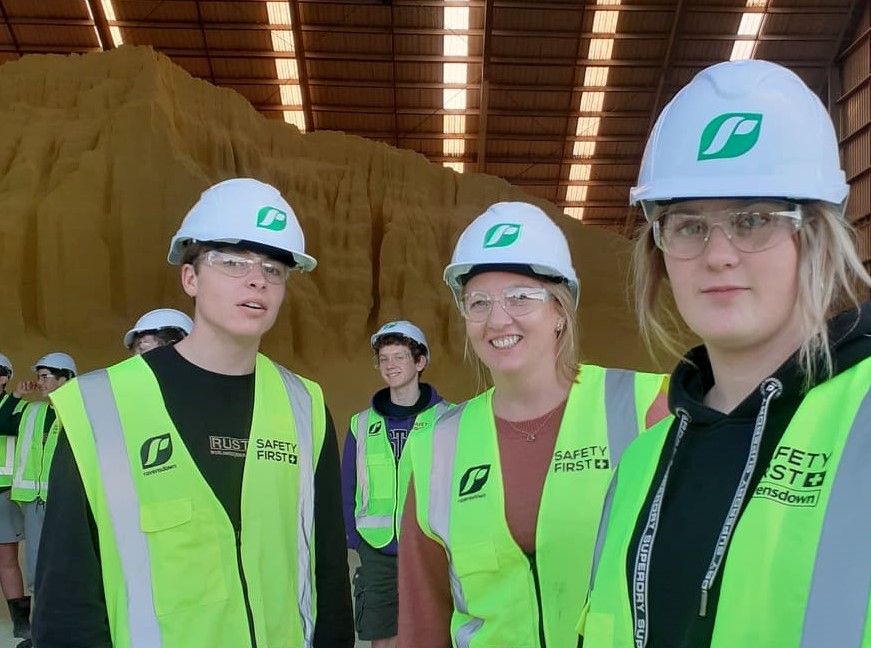
A background working in the Primary Industries and now highly successful teaching career, Coadette Low loves her job!
Coadette Low lives and breathes the Ag industry. She has an unwavering passion and a fist full of knowledge that she is now dutifully passing on to the youth of our nation, through agribusiness education. Agriculture, Horticulture, and Agribusiness she has done it all, from working across the ditch and teaching in Australia for 4 years, and currently in her 8th year of a highly successful teaching career here in New Zealand, she certainly has the accolades to prove it.
- Teach NZ Secondary Teachers’ Study Support Grant (2021)
- Finalist in the Primary Industry Awards NZ – Emerging Leader category (2021)
- Teach NZ Secondary Teachers’ Study Award (2022)
- University of Waikato Research Masters Scholarship (2022)
- Finalist in the Beef+LambNZ Awards – People Development category (2022)
You also might be mistaken for thinking that Coadette was from a farm, but no, Coadette was an urban gal and grew up in Napier, attending Taradale High School. She did however love animals and at one stage wanted to be a vet, but after a work placement during her school years, realised that it wasn’t the correct pathway for her. Not adverse to hard work, in Year 11, through a family contact, “Brendan Mahony Shearing”, she nabbed a job in the shearing sheds as a wool handler, working in the weekends and every school holidays. In Year 12 however, she still didn’t know what she wanted to do and almost left school to go and work full-time. To this day she is grateful to her mother for convincing her to stay and finish Year 13.
One of the farms that she worked on as a wool handler was a sheep stud, north of Napier near Tutira. After her chats to the farmer about his genetics programme, this sparked an interest in the genetics field and Coadette went on to study a Bachelor of Science – Majoring in Animal Science and Physiology, at Massey University. She was lucky enough after her degree to secure a job with Thomas Foods International abattoir in South Australia.
“They flew me out the day after my last exam. They paid for everything, and I knew that if I didn’t take the opportunity to head overseas and work after uni, I probably never would’ve done it”. After five years working in the abattoir, in Quality Assurance, her role varied from microbiology, carcass grading, support on both slaughter floors and boning rooms (sheep + cattle), quality audits, traceability and complaint procedures. Knowledge wise, by this stage Coadette was more than qualified to start teaching. She remembers a past Biology teacher at high school recommending that she should be a teacher, and it was only after working in the abattoir that she considered it.
Coadette completed her Graduate Diploma of Secondary School Teaching at the University of Adelaide in South Australia and taught in Australia for 4 years before the heart strings started to pull for home. In 2016, a high school friend who was teaching at Wairarapa College at the time sent her a job advert for Head of Agriculture at Rathkeale College in Masterton. She applied that weekend and the rest is history!
In 2018, Coadette implemented the Agribusiness in Schools course, after hearing about it at a HATA conference and through Melanie Simmons, the Agribusiness in Schools Advisor. With the support from the community and students, she was keen to take it on. At the start of 2023, Coadette took on the new role, as Head of Department Agriculture at Mount Albert Grammar School in Auckland and TiC of their Agribusiness in Schools programme.
Coadette’s passion for teaching mostly comes from the students who take it and the relational aspect, both theoretical and practical. She also of course loves the subject content, as the information is forever evolving, and she is always continuing to learn. Coadette states that the most popular careers that students tend to go into after completing an Agribusiness related degree are; Marketing, Consultancy, Rural Banking or Logistics. However, their first “taste “ literally is the Agribusiness in Schools programme, where student assessments include practicals on harvest to product. The students can make Camembert cheese, honey and biltong. It is a subject that focuses on beyond the farm gate, but also the entire value chain, where students look at aspects from innovation, technology, value adding, financial decisions, external factors of influence and is a subject that encourages critical, analytical thinking and problem-solving.
Coadette believe that all schools should teach Agribusiness alongside the Agricultural and Horticultural Sciences. ‘‘Any teacher who has an interest in food and money would excel at teaching the course, the only challenge is finding those teachers.’’ The other challenge is schools understanding the importance of offering the subject to the young people of New Zealand and the flow on effects that it will have, not only as they go into their career pathways after secondary schooling, but also into becoming conscious consumers, aware of sustainable practices, what mitigations are already in place, how they work, and what future research is being engaged with.
Coadette goes on to say, “it is our duty to ensure that we educate the youth of New Zealand about the Primary Industries here in New Zealand, and how important it is to our own economy’’. All New Zealanders need to be aware of their own impact on the environment, which includes reflection of their footprint, purchasing habits and understanding where their food comes from.
2022 Agribusiness and past St Paul's Collegiate School student, Maia Kelly reflects on her time learning the subject.
Maia applied for and won the “Hiranga” Scholarship to attend the University of Canterbury and went on to study Law and Commerce, (majoring in Economics).This combination, she felt would well prepare her for a range of future career aspirations, including within the agribusiness sector.
Maia was first attracted to the course as an option through her interest in Economics. Not knowing anything about the Primary Industries, being a “townie” without a farming background and picking up the subject late in Year 13, she definitely had a few hesitations, however none of these factors seemed to inhibit her at all. Maia described studying the Agribusiness in Schools subject as highly interesting and a real “eye opener” into how important the Primary Industries are, to the economic survival of New Zealand.
With job opportunities extending well beyond the farm gate, such as food technology, aquaculture, equine, and forestry - just to name a few, Maia found this is an exciting aspect of the curriculum.The Agribusiness in Schools programme has four main areas of learning;
- Agri-science
- Agri-marketing
- Agri-management
- Agri-Innovation
At St Paul’s Collegiate School in Hamilton, Agribusiness has its own dedicated Gallagher Centre of Excellence building that consists of two classrooms and a kitchen, where students can experiment with making food products. One of Maia’s internal assessments was learning how to make Camembert cheese. With the focus on innovation, a probiotic was added to the cheese to increase its market value. Maia recalls learning about this, and laughs about the fact that she didn’t have any idea of how Camembert cheese was made! “It ended up like a hard goo that was covered in liquid and then we had to cut it” Another practical assessment she really enjoyed was learning how to make biltong.
During her studies, she went on to develop a special interest in environmental issues. Maia said that taking Agribusiness, greatly increased her awareness of current affairs and topics she was learning about at school, were appearing on the news! One such topic was the negative effects of nitrogen leaching into the waterways of New Zealand. In Maia’s Economics class at the time, they had also been learning about “negative externalities in production” and found the cross over of subject matter, very complimentary and added a different lens as well as depth and breadth to her learning in both subjects.
One of Maia’s most memorable learning experiences from the programme was “The Crocodile Pit”, where a panel of 6 expert judges, rated the marketability of the students Agribusiness related product or service they had invented. There was the possibility of winning $400 cash for your group and the opportunity to showcase your product at the New Zealand National Fieldays Innovation Hub in 2022. This was her very first assignment and admits she was “slightly terrified” at the time, but saw it as such a great learning experience on how to market a product successfully in the real world.
In 2022, COVID-19 put a halt on things like fieldtrips and guest speakers, which are usually a main feature of the Agribusiness in Schools curriculum. Unfortunately, traditionally Agricultural and Horticultural Science subjects in education have been seen as non academic subjects, however Maia believes that the Agribusiness in Schools programme would be beneficial and interesting to anyone with a strong work ethic.
She goes on to say that ‘‘you don’t necessarily have to excel at math or science, although this would definitely help, as there is a lot of practical learning, researching, gaining knowledge and then analysing those findings to come up with multiple solutions to a problem Maia loved the problem solving side of the Agribusiness in Schools programme and learning about the inner workings of a business.
"The Primary Industries are always thinking about opportunities for future growth and expansion, focusing on problems and how they can be improved, and I like this about the industry."
Simple solutions for best outcomes
Written by Mark DanielDesigned as a holster for needle-based vaccination guns, the plastic moulded device incorporates an integral reservoir to house a disinfectant solution to sterilise the injection needle each time the gun is replaced in the holster. This helps ensure that vaccinating a large mob is quicker, easier and safer, while removing the risk of disease transfer and the need to constantly change needles.
The clever duo came up with the idea when Ben’s grandfather, Linden Hunt, raised the issue of the tedious task of constantly changing needles or finding a way to disinfect them while velveting. Looking at the problem more closely, the team soon found there didn’t appear to a solution to sterilising needles in the marketplace. This led to collaboration with Hamilton-based DEA Plastics, who already operated in this field.
Suitable for all types of farming operations and for veterinarians, Sterineedle incorporates an integral clip for belt mounting, but could just as easily be mounted to a race or cattle crush for convenience. For more info, contact k.allen@stpauls.school.nz.
To read the full article go to the article at the Diary News



